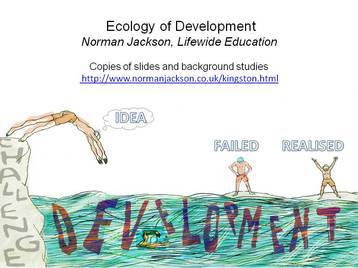
Ecology of Development
Norman Jackson, Founder Lifewide Education
An individual's learning ecology comprises their processes and contexts, relationships, networks, interactions and activities that provides them with opportunities and resources for learning, development and achievement. Organised educational settings provide ecologies for learning into which learners fit themselves but outside formal education settings self-created learning ecologies are essential to the way we learn and develop in work, family and other social settings. The ability to create our own processes for learning and development is perhaps the most important capability we need for sustaining ourselves in a complex, ever changing and often disruptive world. Our learning ecologies are the means by which we connect and integrate our past and current experiences and learning. They embrace all the physical and virtual places and spaces we inhabit and the learning and the meaning we gain from the contexts and situations that constitute our lives. Our learning ecologies are the product of both imagination and reason and they are the vehicle for our creative thoughts and actions. They are one of our most important sites for creativity and they enable us to develop ourselves personally and professionally in all aspects of our lives.
References
Jackson, N. J. (2013a) The Concept of Learning Ecologies, in N. J. Jackson and G.B. Cooper (eds) Lifewide Learning, Education and Personal Development E-book Chapter A5 available on-line at http://www.lifewideebook.co.uk/conceptual.html
Jackson, N. J. (2013b) Learning Ecology Narratives, in N. J. Jackson and G. B. Cooper (eds) Lifewide Learning, Education and Personal Development E-book Chapter C4 available on line at: http://www.lifewideebook.co.uk/research.html
Learning Ecologies Lifewide Magazine
Learning Ecology Narratives Lifewide Magazine
POWERPOINT SLIDES
Norman Jackson, Founder Lifewide Education
An individual's learning ecology comprises their processes and contexts, relationships, networks, interactions and activities that provides them with opportunities and resources for learning, development and achievement. Organised educational settings provide ecologies for learning into which learners fit themselves but outside formal education settings self-created learning ecologies are essential to the way we learn and develop in work, family and other social settings. The ability to create our own processes for learning and development is perhaps the most important capability we need for sustaining ourselves in a complex, ever changing and often disruptive world. Our learning ecologies are the means by which we connect and integrate our past and current experiences and learning. They embrace all the physical and virtual places and spaces we inhabit and the learning and the meaning we gain from the contexts and situations that constitute our lives. Our learning ecologies are the product of both imagination and reason and they are the vehicle for our creative thoughts and actions. They are one of our most important sites for creativity and they enable us to develop ourselves personally and professionally in all aspects of our lives.
References
Jackson, N. J. (2013a) The Concept of Learning Ecologies, in N. J. Jackson and G.B. Cooper (eds) Lifewide Learning, Education and Personal Development E-book Chapter A5 available on-line at http://www.lifewideebook.co.uk/conceptual.html
Jackson, N. J. (2013b) Learning Ecology Narratives, in N. J. Jackson and G. B. Cooper (eds) Lifewide Learning, Education and Personal Development E-book Chapter C4 available on line at: http://www.lifewideebook.co.uk/research.html
Learning Ecologies Lifewide Magazine
Learning Ecology Narratives Lifewide Magazine
POWERPOINT SLIDES
| ecology_of_development.ppt | |
| File Size: | 8462 kb |
| File Type: | ppt |
HANDOUT
| ecology_of_development.pdf | |
| File Size: | 42 kb |
| File Type: | |
Example professional learning ecology formed around the creation of an open educational on-line course by Chrissi Nerantzi